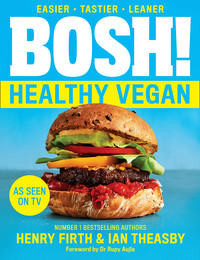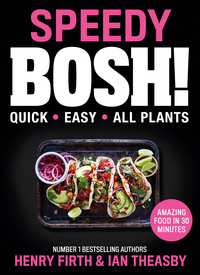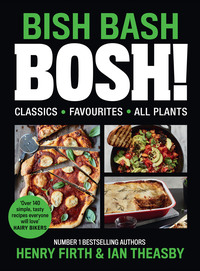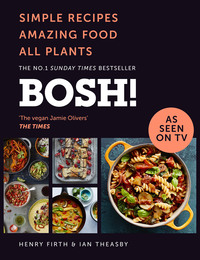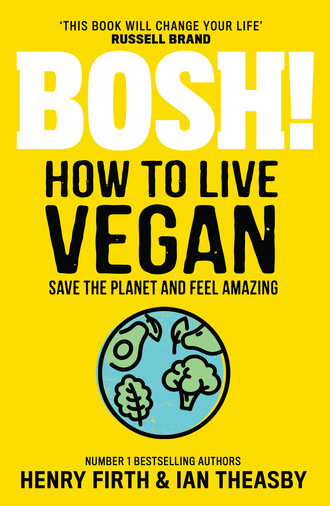
Полная версия
BOSH! How to Live Vegan

As Oxford University’s Joseph Poore explains, fossil fuels represent about 61% of today’s emissions.
Some estimates say as much as 40% of historic global warming is caused by forest clearance that was undertaken to make way for animal agriculture.
Currently, 25,000 species are threatened with extinction because of agriculture. Freeing up the land given over to animal farming will take some of this pressure off the global biodiversity crisis.
It will also reduce our nitrogen and phosphorus pollution, and will reduce acid rain by about a third.
A plant-based diet will reduce the amount of water we need to produce our food by 25%.[60]
Yes, there are exciting developments in lab-grown meats and these could herald cheaper, less cruel forms of meat production. Many people are also big advocates of insect protein, although the morality of farming and killing gazillions of insects is still not in line with our moral standpoint. And both are still mildly processed, lab-made foodstuffs.
What about soy then? Soy is a great source of protein for those on a plant-based diet, although it is also the main cause of rainforest deforestation, which is being torn down to provide land to support it. This is an argument often used by anti-vegans, but let’s remember that while around 70% of the world’s soy is fed directly to livestock, only 6% is turned into human food.[61] (See over the page for more on soy.)
In short, moving to a more plant-based diet is better for the planet and will reduce emissions. It will free up more land, which can then be rewilded and start to draw down carbon and solve our biodiversity crisis. And all the grain and soy which is currently fed to animals can be used to help feed the poorest nations. And the water which is not used for rearing those animals can be used for irrigating crops.
Of course, we appreciate that it is all far more complicated than that. There are good farms and bad farms. And conditions and practices differ all across the world. We all know people who keep chickens as egg-laying pets, and we can’t really compare them with a 1,000-strong battery farm where chickens never see the light of day.
There are bad ways to farm vegetables too, and we’re not advocating a move to more monocrops.
However, ultimately, wherever your meat, fish or dairy is coming from, it is a less environmentally friendly choice than any plant-based food.
A plant-based meal is more sustainable than one containing animal products. And so, the more plants you eat, the better.
SOY
IS IT BAD FOR ME, AND IS IT BAD FOR THE PLANET?
Depending on who you are, you might see soy as either a wonderful health food or a risky ingredient to be avoided. And as far as the planet is concerned, there are differing opinions about how soy for humans is affecting the health of the planet. Some see it as the cure-all for our planet’s woes, and some see it as the cause of rainforest deforestation. Let’s delve into them both.
Soy is, on balance, a health food.
Some people, as part of some research from the 90s, formed the opinion that soy could be bad for your hormonal health. They drew inferences from the fact that soy contains oestrogen-like compounds and speculated that it could mess with the hormonal balance of both women and men in different ways. These studies have largely been disproven now, and recent research shows that moderate consumption of soy foods can actually have some benefits.[62] Even a correlational relationship is not maintained, so largely we know this is not the case.
On the other hand, soy is a very powerful and healthy plant-based protein. It’s a complete protein, containing all the nine essential amino acids we need in our diets (see here for more on these). And it’s a good source of omega-3 fats, iron, zinc and calcium.
Soy fields are a cause of rainforest deforestation, but this soy is grown for animal feed.
Significant amounts of the Amazonian rainforest are being destroyed every day, and these trees are crucial to our planet’s survival. They are the lungs of our planet, and their loss is a significant factor in contributing to climate change.
A large amount of the rainforest deforestation occurs to make way for large, monocrop soy fields. This has been used regularly to illustrate that vegans’ choice of soy milk is poor. But that’s not the full story!
Eighty per cent of the soy that is grown in the Amazon (the soy for which the rainforests are being destroyed) is fed to animals, [63] and indeed up to 90% of the rainforest’s total deforestation is for animal agriculture.[64] But as we’ve seen, only 6% of the soy produced globally is consumed by humans.[65] So, while it is true that the megafields of soy are causing mass destruction of the rainforest, it’s the animal agriculture industry that is causing it and utilising the soy.
Also, when comparing the environmental impact that soy has on the planet versus an animal-based protein like beef, you should take into consideration all the soy the animal has consumed as part of its lifecycle. When framed like this it seems silly to compare the two. Rearing an animal is a much less efficient way to get protein, with only a fraction of the energy that is fed to the animal as plants being available to humans as meat. (See here).
So, despite what many people would have you believe, you should feel free to consume soy with a clear conscience, from both a health and environmental perspective. It’s good for your body and is much more environmentally friendly, when you look at all the factors involved, than eating a comparable animal protein. Miso, soy sauce, soy milk, edamame, tofu and tempeh are all wonderful choices for you to include in your diet. We highly recommend getting on board with soy. It doesn’t deserve its bad reputation, and in fact is part of the solution to the planet’s ills, not part of the problem.
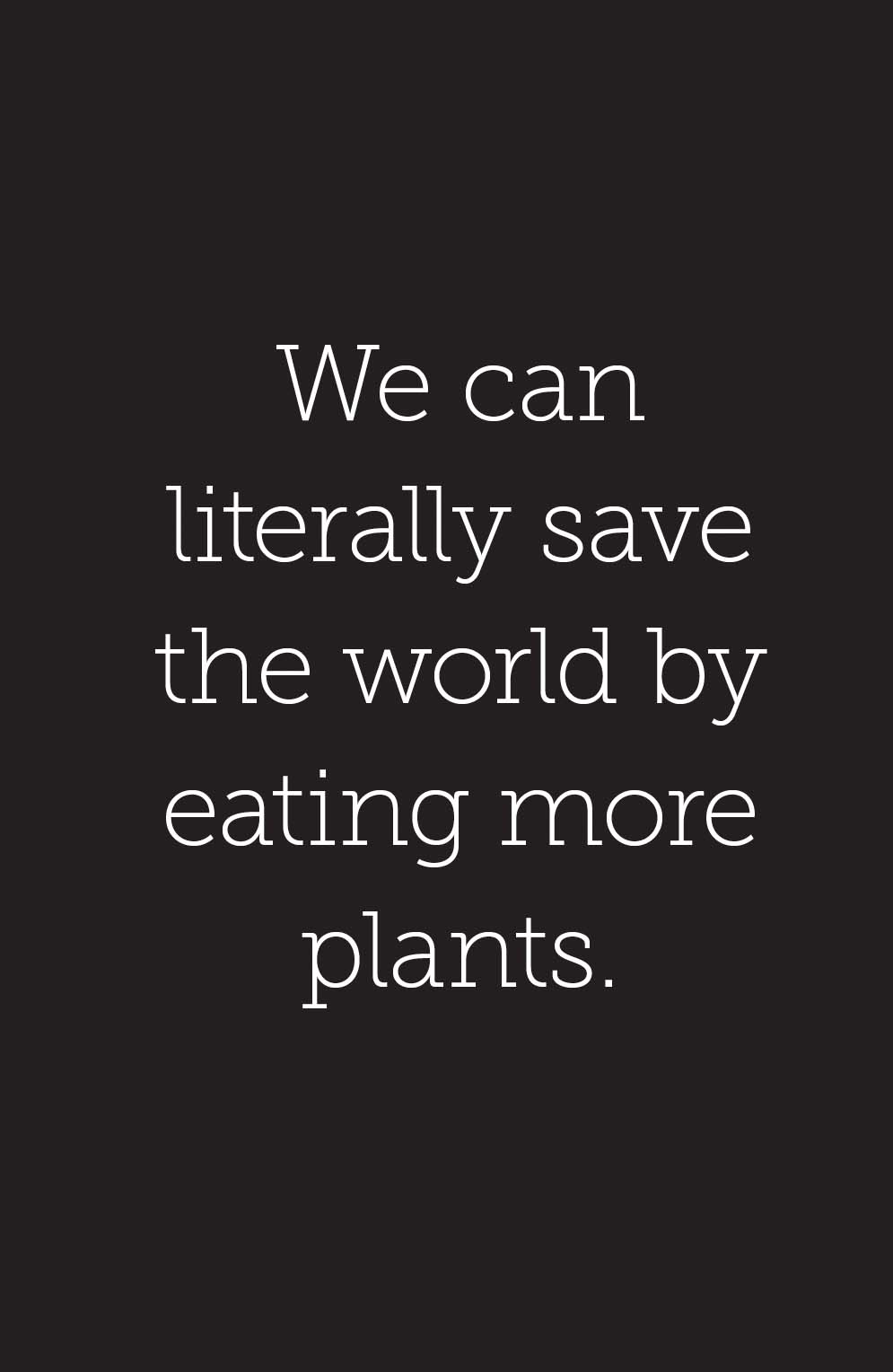
CAN I REALLY MAKE A DIFFERENCE?
When we told our friend Naushard we’d gone vegan, he exclaimed that he’d found a flaw in our plan. He discovered that the motivation was climate change. And so, with a devilish look in his eye, he told us jokingly (or not jokingly) that for every steak we didn’t eat, he was going to eat two steaks!
Great banter. Naushard is a funny guy. But let’s delve into his threat for a moment. Not only did he not buy into our logic about cutting out meat having a positive impact. He didn’t think that our not eating meat was going to make any difference at all. But he was also threatening to ensure that our change didn’t make any tangible difference anyway, by upping his meat intake to counter our meat decrease. Funny. And kind of evil.
The last time we saw Naushard, we were shocked to hear that he had given up meat. ‘I don’t eat steak anymore. I’m still eating fish, but no more steaks.’
To hear him backtrack was a genuine shock. He is the last person you would expect to go back on his word. He would prefer to keep the joke going at the expense of the truth if it made it funnier. And here he was admitting that he had not only broken his promise, but had done a total about-turn and joined us in the beef-free camp!
We see this all the time. We love it and it’s one of the best things about our job. Talk to any vegan, and they’ll have a story like this one. And it goes to show that you really do make a difference to those around you. We all affect everyone we come into contact with. What we are saying is that the system will never change if you don’t change first. Often, too, we’ve found it’s the ones who mock you the most who join you in the end – just like Henry used to laugh at Ian when he first went vegan!
Every big change in history has been started by a small collection of individuals, striving for a better world.
Whether it’s the creation of the United Nations as a peacekeeping organisation after World War 2,[66] the abolition of slavery or the global, ongoing move away from tobacco. These movements towards a better world were spearheaded by individuals changing their own views and actions, which in turn affected the views of others.

When people ask us why we’re vegan, one of our responses is: ‘To avoid awkward conversations with our unborn children.’ Our generation – and the generation before us – has presided over the biggest extinction event in recent history, and it is the next generation that will pay the price for our inaction.
You really can make a difference to the world just by virtue of the decisions you make.
There can be no greater way to care for the happiness of others than to preserve the planet and future for them. The predictions of where the planet may end up otherwise are too grave to consider. We owe it to our young people to do something about climate change before it’s too late. The effects of our actions will be felt by them. They will be clearing up our mess. Think about the conversations you’ll have with them in the future. ‘What did you do when we could have stopped climate change, Daddy?!’
It may feel easier to avoid responsibility by thinking that the problem is bigger than us, or has been around longer than us. But to put it into perspective, consider how long humans have existed, and how recently climate change has escalated.
Humans have been on the planet for 12,000 years, but it’s only in the past 140 years that we‘ve burned fossil fuels, which has caused a lot of our current problems. Just 30 years ago, we knew most of what we know now about climate change, and we nearly put the wheels in motion to stop it. But we didn’t. And since then we have done almost everything in our power to make it worse. We have a couple of decades to stop complete, irreversible disaster. It’s crunch time.[67]
We can’t sit back and do nothing. Let’s spend our time on Earth trying to fix what we’ve broken – and enjoy some amazing food along the way!
YOUR MONEY IS YOUR VOTE
The money you spend is a vote for how you believe the world should be. Every single thing you buy fuels the economy. Every plant-based product that you buy tells the global economy that you want more plant-based – and therefore more sustainable – products. And every animal product that you buy tells the global economy that you want to continue to consume animal products, which are, we know, significantly worse for the planet.
What the world needs, for us to survive, is for us to spend our money on delivering change. If enough of us change our buying habits, then we can take our planet off the pressure cooker. We can start to put measures in place to cool it again, while letting the animal kingdom recover.
NOW IT’S YOUR TURN
Right now, let’s take a moment to think about how we can all make a few simple changes to what we buy to help make a real difference.
What do you spend your money on?
What is the money that you spend demanding from our economy?
Are there any changes that you could make to start persuading food producers to act more sustainably?
If you do eat meat, how often?
Do you think you could reduce it?
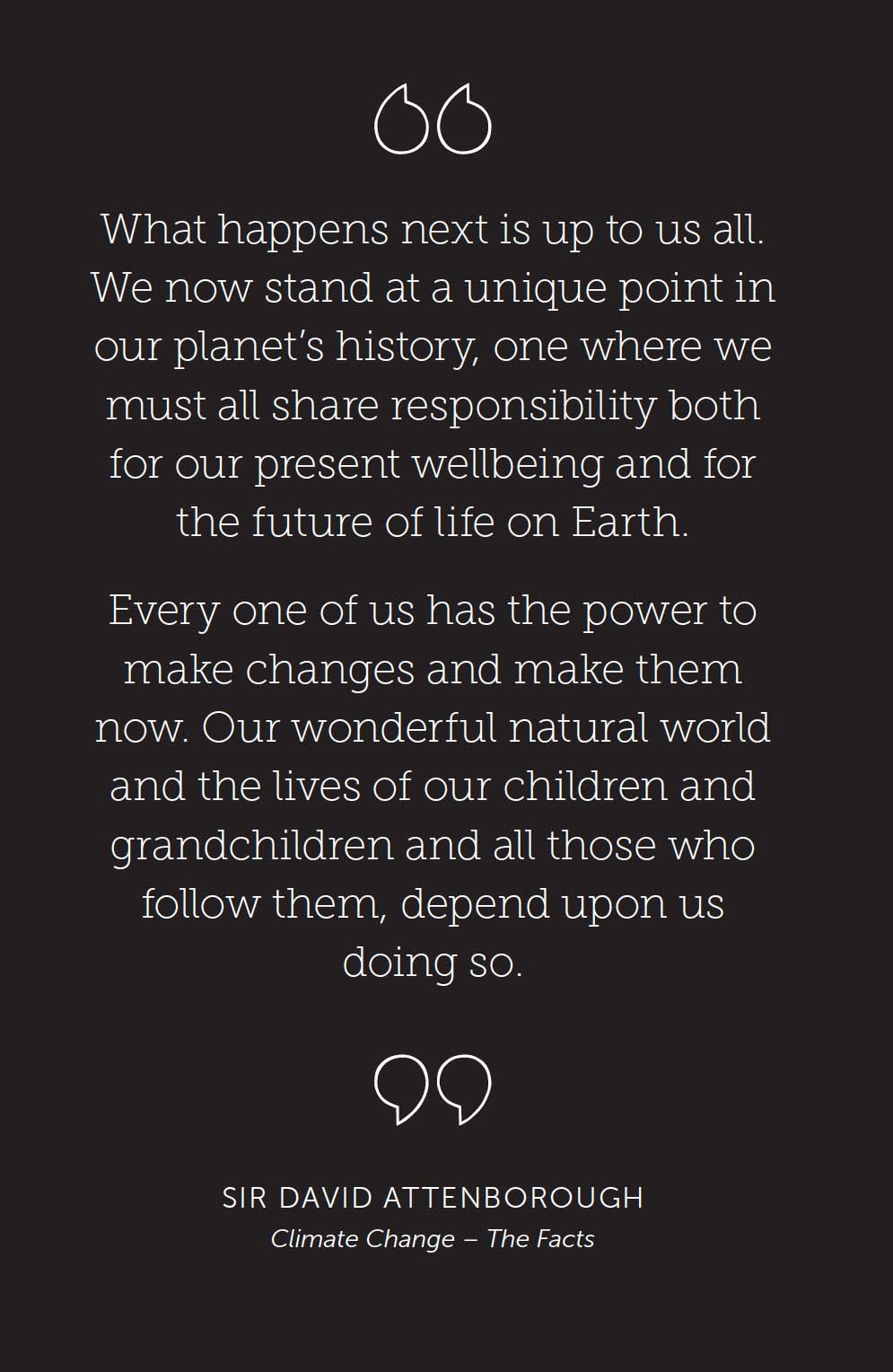
GRETA THUNBERG
In 2018, at the age of just 15, Swedish schoolgirl Greta Thunberg protested outside government about the need to take action on climate change. She caught the attention of the media, and went on to inspire hundreds of thousands of students in countries all around the world to follow her action with ‘school strikes for climate’. In March 2019 an estimated 1.4 million students from 112 countries joined her in strikes and protests. And another global strike in May 2019 saw 125 countries getting involved. Greta’s passion for her cause led to a nomination for the Nobel Peace Prize. So powerful and far-reaching has her influence been that it is known by some as the ‘Greta Thunberg effect’.
Greta has since staged a TEDx Talk, spoken at the United Nations summit on climate change as well as many other international events with some of the world’s most powerful leaders. She is an amazing example of the impact one person can have. In front of global governments filled with those old enough to be her parents, her grandparents or even her great-grandparents, Greta stood up for something she believed in and is making a difference.
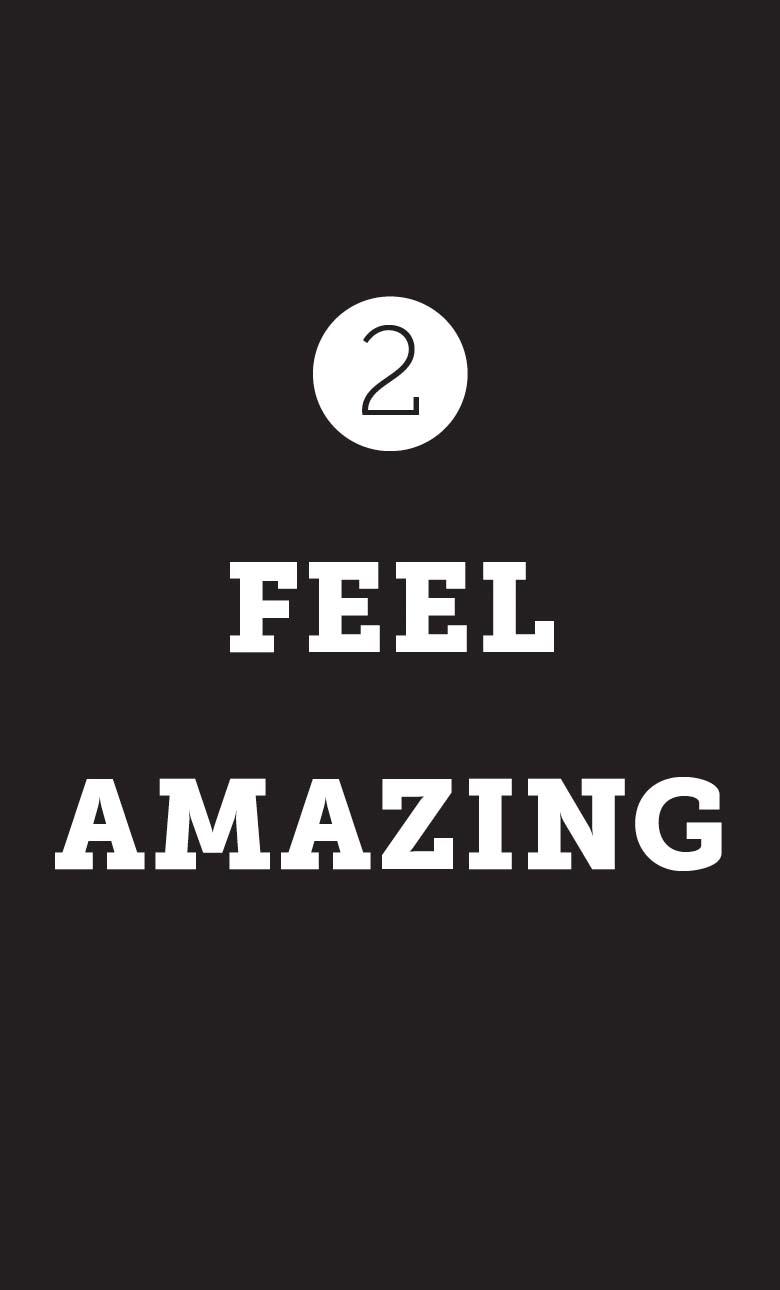
YOU WILL PERSONALLY BENEFIT
One of the best things about being vegan is that, in some poetic twist of fate, the very thing that can save our planet is also a better way to live. The chances are, you will feel better on a plant-based diet. It can help you live a longer, happier, healthier life, while still delivering all the deliciousness that you’re used to. It can be cheaper and easier, too.
This might just be the best decision that you ever made.
We met an Uber driver once after a supper club we hosted. He was one of the most smiley men you’ll ever meet. But he told us a story. Five years ago, his sinusitis was so bad it was making his life impossible. He had tried everything. He couldn’t breathe. He couldn’t sleep. His face was on fire and his eyes were constantly streaming. Nothing worked and quite simply he didn‘t know what to do. He was miserable and at his wits’ end. Someone suggested he try a vegan diet but he ignored the idea. His suffering was so bad that it was seriously affecting his life, as well as his friends and family. Life couldn’t go on like this. He even considered ending it. Then he decided he might as well try going vegan.
He cut out meat, dairy, fish and eggs and switched to a diet based on whole foods and colourful vegetables. Within weeks his sinusitis cleared up. He felt better than he had in years. Over the following years he lost weight and shared his story, and his transformation, with everyone. Most importantly, he discovered a new way of living and eating. Stories such as this are really common.
We are constantly messaged by people who have seen incredible health benefits and recoveries from poor health following a switch to a plant-based diet. Whether it’s recovery from asthma or obesity, we have been told dozens of stories like our Uber driver’s. Ask around and you won’t have any trouble finding loads of anecdotal evidence for how much better you feel when you switch to vegan eating.
We can also echo that view. We felt AMAZING almost as soon as we cut out meat and dairy. Within days, we both felt like we’d discovered a superpower, a new feeling of lightness, a new energy that we didn’t have before. We still feel that way today; we’ve never looked back.
The 3pm lull in energy? Not a thing any more. That feeling after you’ve eaten too much fatty food? That’s gone, too. Feeling slow and lethargic in the morning? That doesn’t happen now. Henry’s crippling hay fever pretty much disappeared as well. Before, he used to spend the summer months in misery – streaming eyes, sneezing, feeling tired all the time … popping antihistamines every day. Now, he has maybe four or five days a year where he might suffer due to a very high pollen count. Choosing vegan was the best decision of our lives.
So that’s the good news. And we think it’s pretty awesome news. The one thing that we can all do to reduce the damage to our planet and maybe even reverse climate change, is also an incredibly powerful change to make for ourselves. One that may make you feel better than ever before.
You can have your cake and eat it. As long as it’s vegan cake.
YOU’LL BE HEALTHIER TOO
It is ironic that some people criticise the vegan diet for being unhealthy, when the standard, western way of eating is much less healthy! Highly processed, high in fats, low in fruit and veg … In today’s world of high cholesterol levels and high blood pressure, a plant-based diet is the best way to lower cholesterol. Plants are completely free from cholesterol.[68]
On a vegan diet you’re eating an incredibly diverse range of plant foods on a regular basis. It’s one of the things that makes sticking to a vegan diet so easy – you get to explore and enjoy so many more amazing ingredients than you might if your diet was based around animal products. Plant-based cooking encourages us to be more adventurous and experimental with our food choices – and we love it!

Plant-based foods are rich in fibre, antioxidants, folate and various phytochemicals, all of which are all great for our general health. Often a whole foods, plant-based diet contains fewer calories too, so it’s easier to maintain a healthy body weight, and many people say that any excess weight just falls off (it did for us).
If you’re worried about your energy levels or maintaining your performance at the gym, know that many world-class athletes have made the switch to a plant-based diet, including premiership footballers, basketball players, boxers and tennis champs. They all claim better recovery from exercise and better digestion on a plant-based diet. But perhaps the most persuasive example of this is Patrik Baboumian, the German stongman competitor who has broken world records since becoming vegan. We applaud and admire these amazing, inspiring, ripped dudes and dudettes who are smashing it on a plant-based diet. We are so grateful to them!
There are countless studies to back up the fact that a balanced plant-based diet, or a mostly plant-based diet, is the best diet for your body – it can even reduce premature deaths from chronic diseases by more than 20%.[70] These are studies from objective bodies like the World Health Organization, United Nations,[71] Harvard University,[72], [73] Oxford University,[74] as well as progressive governments – for example, the Canadian government has removed dairy entirely from its list of recommended foods, which is now 90% plant-based.[75]

Processed meats and fish have now been linked to increased risk of breast cancer.[76] Eating red meat substantially raises your risk of death from cancer or heart disease.[77]
A plant-based diet is increasingly recognised as a healthier alternative. Atherosclerosis, or plaque in your arteries, associated with high intake of meat, fat and carbohydrates, is the leading cause of death in the USA.[78]
The World Health Organization (WHO) has listed red meat and processed meat as carcinogenic.[79]
The US FDA now advise that some fish and shellfish can contain unpredictable and potentially damaging levels of mercury, and is now deemed unadvisable for pregnant women, breastfeeding mothers or children.[80]
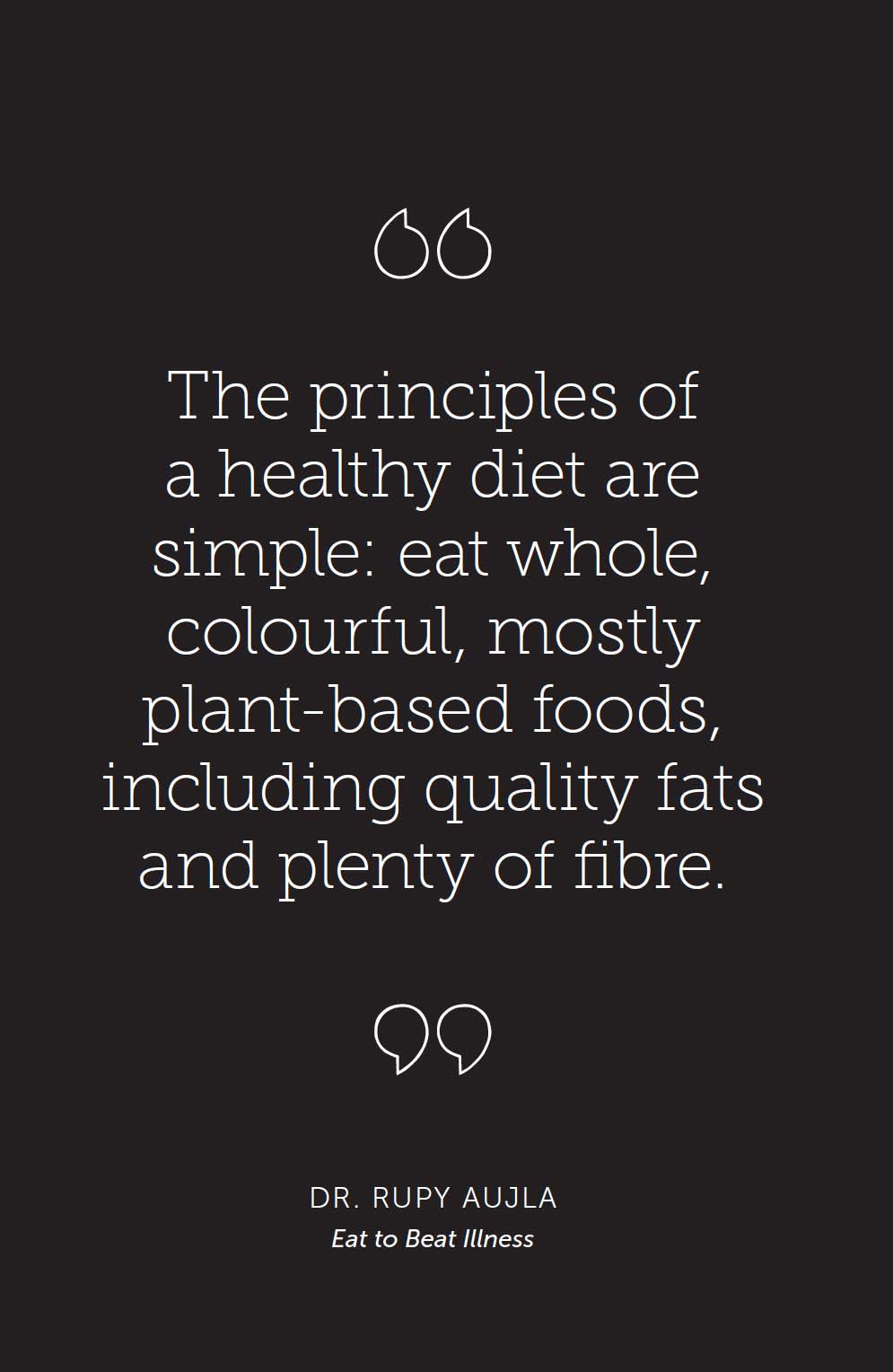
FEEL CLEAN
A plant-based diet is also really clean! The main foods that are likely to be contaminated if not handled, stored or cooked properly are raw meat and poultry, raw eggs, raw shellfish, unpasteurised milk and ready-to-eat foods like sliced meats, pâtés and soft cheeses.[81] Not plants. To put it bluntly, if you get food poisoning from animal products, it’s bad luck. If you get food poisoning from plant-based foods, then generally it’s because someone in the kitchen has not washed their hands properly.[82]
By contrast, coliform bacteria, which are used as a marker for faecal contamination, typically find their way into your kitchen via meat, which is often contaminated with faecal bacteria.[83] Plant-based foods are inherently cleaner, and a plant-based kitchen is a cleaner kitchen.
The other thing that will be cleaner is your conscience. By choosing more plant-based foods you will know that you are living in a more sustainable way. This peace and clarity of mind is invaluable – something we both experienced when going vegan. The way we were eating synced with our values. We suddenly felt like everything made a bit more sense, and it helped inform a lot of the other decisions we made in our lives.
There is a new kind of consumer appearing, one who is more conscious of their health and the environment, one perfectly happy to make dietary changes, such as becoming vegan, vegetarian or flexitarian to achieve those aims. Perhaps our friend Zanna Van Dijk, a fitness influencer who made the move to a plant-based diet, said it better than we can:
‘Eating plant-based completely transformed my mindset, as finally my actions were in line with my values. I found myself more compassionate towards animals and humans and connecting more deeply with those around me.
‘I found a new appreciation for the environment and a heightened sense of consciousness in all my actions and the impact they have on people and the natural world. I realised that I’m part of a bigger picture, my choices go far beyond myself and that power comes with responsibility to be a good human.’
IT’LL SAVE MONEY, TOO
Compared to a typical meat eater, vegetarians can save much more on food each year,[84] especially if you are comparing plant-based items with high-quality, higher-welfare meat. If you’re looking to keep costs down, then we suggest avoiding processed, packaged ‘vegan’ foods, and instead look to fill your plate with vegetables, grains and home-cooked foods – which is, of course, the best way to eat for your health, too.
When we’ve been short of cash, we’ve both relied on forward planning. And we try to do that now too because it makes good sense (see here for advice on how to meal plan). Ian remembers when he first moved to London. He was on a very low salary, thankful to be living and working in London, but after rent and bills were paid, he was left with very little money. He tracked his outgoings and worked out pretty quickly that he was spending too much on food. Ian started to approach lunch like a fun challenge and gamified the process of designing budget lunches. The budget he set himself was five quid for five days. One pound a day. That might seem ridiculous but, as he says himself, ‘I’m from Yorkshire and frugality runs through my veins.’ With a little creativity, confidence and the right attitude, eating on a budget is not only possible but actually, very satisfying. And it’s just as easy as a vegan!


